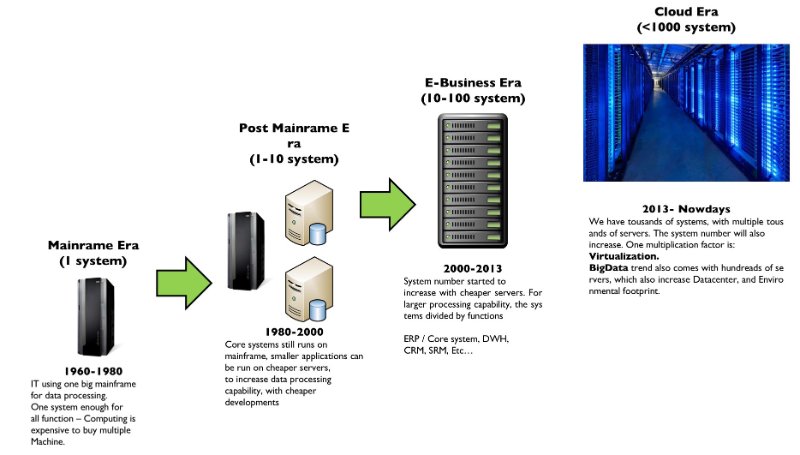Virtualization has been always an interesting topic. To better understand my opinion, we need to look back to the past. As I'm working in the Finance sector, I will mainly use examples, from this industry, but it can apply to any other sector.

In the past a mainframe computer was able to provide enough performance to handle all computational needs which a large institution needed. If we are honestly thinking about the functions, what we are currently consuming, it doesn't change a lot. From the '80-es until 2000 this one integrated system changed a lot. IT Server manufacturers started to create cheaper systems, and companies started to offload functions from the mainframe to these systems. With this we were able to decrease the overall cost of IT, but we implanted a lot of complexity to the systems. With this change, we made huge dependency on interfaces, and interconnects between the systems. Later on in the early years of the second millennium, we started the E-Business era. With the internet, the system numbers incredibly increased. Companies started to implement new systems (CRM, SRM, DWH), and these systems also increased the complexity. With a lot of separate servers, it is hard to manage the server utilization in a proper way. VMware found this market gap, and announced their virtualization platform. In the current Cloud era, the system numbers can be ten thousand at a larger company, but the question is always that:
My opinion is that, these things have grown over us, and someone at every company should speak out that: It is time to redesign the systems. Of course it is always hard to make it understandable to the Business that, we need to spend money on housekeeping, but I think intelligent persons understand the importance of the cleanup. No one wants to live in a mess.
From my point of view, the virtualization is only a kind of concealment of the mess what exist in the infrastructure. Like the one who has a hammer, want to fix everything with a hammer.
I think, the CIO of the company is responsible to manage this situation, and decide what systems/functions can be migrated together. The current servers have enough power to handle larger loads. We always need to calculate with the infrastructure, power increase. Most of the people say "Hurray, we can run more virtual instances on one server", but why we need virtualize, if we can consolidate functions. If we consolidate the functions to less systems, we can decrease the number of interfaces, which reduce the overall complexity. Less complexity makes faster developments and more stable systems one the one side, and less maintenance window on the other side.
For Virtualization I get always that positive feedback, it can move between instances, as part of High-Availibility, but the point which everyone forgets this is only true for scheduled system live migration. If a hardware broke down, then the virtual machines which run on it goes offline. The other positive advantage which always mentioned the scale of the system. We can increase and decrease resources when we need.
Cloud is a next evolution of the virtualization. With cloud we move our complex, messy landscape to a service provider, like if we don't see the mess, it is not exist. This is a dangerous strategic step, from two sides, one is that we move our competence to an external provider, but not only with the systems, but data also. Depending on the cloud usage level, it can be different levels, but I think the most dangerous is that, if we consume application from a Cloud provider. It is OK until we are in good relations with the provider. But if we want to migrate out, then we can face that fact, it is an extra effort for them, so you need to pay extra. This extra is always measurable to that amount, that the migration out is not a positive business case. And at that point you are out of control, In case of problem you can only trust in that they solve the problem. The responsibility for the operation in this case still at the company.
The second danger of the cloud is on local IT, if you move your all systems to the cloud, then the company doesn't need the same level of IT organization. As this is a service contracting, and procurement question, than Finance, and Procurement department are able to handle this. In my view the involvement of the cloud in the future is part of dismantling of the IT organization. But the end of the day, the question is that, what level of dependence is that, what the company accept.
What I believe is that, the have a local IT is always the proper way of operation. They have an independent opinion. With the dependence of a cloud provider, the opinions are prejudiced.
If we are thinking with local infrastructure, in an ideal state, the systems are taking place, on a grid infrastructure. Google, and Facebook are a good example, for the consumption of a grid infrastructure. If we run the same application platform for our thousands, or ten thousand of servers, we can distribute workloads between the servers. We can manage the servers as a resource group. If one of the servers broke down, it's only a fact what we can measure with percentage of performance drop instead of outage. Of course, this kind of thinking needs more advanced system design, which more related to the IT profession, rather than ability to choose something from a product catalog.
This responsibility is for the IT Architect of the company, who need to be familiar how hardware infrastructure make influence on application performance, data processing and reliability.
The main difficulty of this system design is the development of this system. The version change of the system must be working online. With the High-availability, we are able to take out parts of the system, and give back when the version change completed.
In the future we will see what directions will we go. We take our time to turn back the exponential growth of the number of systems, or to hide the mess with the cloud.

Your post very very pawaarfull and Important and amazing and good
Downvoting a post can decrease pending rewards and make it less visible. Common reasons:
Submit